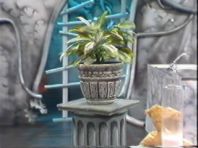It's bigger on the inside! Come travelling in time and space with me to the world of late 1970s and early 1980s TV, and some memorable (not always for good reason!) programmes from my childhood. It's a strange world where VCRs were a luxury item, having a fourth channel was still a novelty, and Sky was an unfashionable 'light classical' band. This is a planet where every BBC sci-fi programme bears the immortal legend 'Incidental music by the BBC Radiophonic Workshop', bored kids shoot the dots off the Schools Programmes clock, Easter holidays means the Childrens Film Foundation and bloody "Animalympics", and Colour Seperation Overlay is the last word in special effects! The following shows are all ones that I have a personal affection for, for nostalgic reasons. Amazingly (or perhaps not), most of them have fan-made home pages - even "Luna"!
|
THE ADVENTURE GAME  This is one of those programmes that was so strange, and long-since-shown, that I am still not entirely sure if I dreamt it. All I can remember is contestants had to navigate their way around various mazes and puzzles before having to cross a grid in space without being whisked away by a spinning vortex. It was presented by dusky newsreading dominatrix Moira Stewart and a talking aspidistra called Uncle, and all the regular characters' names were anagrams of the word 'dragon', as was the show's greeting "Gronda". Sharing not only guest stars but also concepts with "Doctor Who" (Remember the intelligent catcus in "Meglos" and the Exxilon city in "Death To The Daleks"?), as you can imagine I lapped it up! This is one of those programmes that was so strange, and long-since-shown, that I am still not entirely sure if I dreamt it. All I can remember is contestants had to navigate their way around various mazes and puzzles before having to cross a grid in space without being whisked away by a spinning vortex. It was presented by dusky newsreading dominatrix Moira Stewart and a talking aspidistra called Uncle, and all the regular characters' names were anagrams of the word 'dragon', as was the show's greeting "Gronda". Sharing not only guest stars but also concepts with "Doctor Who" (Remember the intelligent catcus in "Meglos" and the Exxilon city in "Death To The Daleks"?), as you can imagine I lapped it up!
|
|
|
BATTLE OF THE PLANETS Again, a distant memory, until I discovered Bravo were repeating it recently. Originally "Science Ninja Team Gatchaman", an ultraviolent Japanese cartoon series from 1973, an American company bought it and redubbed it with Hanna-Barbera voice artists and as "Battle of the Planets", became part of the post-Star Wars boom of kids sci fi (Battlestar Galactica, Buck Rogers, Tron, etc.); and ultimately became the template for every Japanese-originated, cheaply-animated '80s action cartoon (eg Thundercats, Centurions). 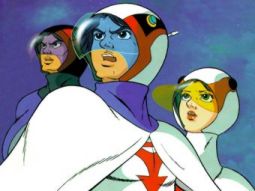 The formula was so simple: You had a team consisting of a square-jawed blue-eyed hero (improbably voiced by Casey Kasem, aka Shaggy from 'Scooby Doo'), a slightly more rebellious, moody sibling, a pretty but brainy female with a voice like Judy Jetson/Josie Pussycat, a babbling, brain-damaged manchild and a fat sidekick with a 'comedy' nickname (let's call him, say, Tiny). Pit them against a cackling, camp villain (maybe with flourescent pink lipstick), a pseudo-fascist army of clones, and a 'weapon of the week' resembling a beetle, shrimp, armadillo or some other crustacean. And then, because it's too violent for the little 'uns, you cut all the really graphic scenes, only to realise that the story now makes absolutely no sense because the violent bits comprise most of the episode. I know, let's stick in some shoddy animation where a gay Jewish R2D2 and a K9-type pet fills the viewer in with the plot (reminding the kids that "luckily no one was badly hurt!"). The formula was so simple: You had a team consisting of a square-jawed blue-eyed hero (improbably voiced by Casey Kasem, aka Shaggy from 'Scooby Doo'), a slightly more rebellious, moody sibling, a pretty but brainy female with a voice like Judy Jetson/Josie Pussycat, a babbling, brain-damaged manchild and a fat sidekick with a 'comedy' nickname (let's call him, say, Tiny). Pit them against a cackling, camp villain (maybe with flourescent pink lipstick), a pseudo-fascist army of clones, and a 'weapon of the week' resembling a beetle, shrimp, armadillo or some other crustacean. And then, because it's too violent for the little 'uns, you cut all the really graphic scenes, only to realise that the story now makes absolutely no sense because the violent bits comprise most of the episode. I know, let's stick in some shoddy animation where a gay Jewish R2D2 and a K9-type pet fills the viewer in with the plot (reminding the kids that "luckily no one was badly hurt!").
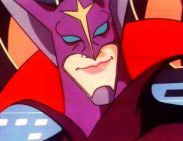 The denouement would involve the heroes teaming up to form a human pyramid and transform into a superweapon. If it all sounds suspiciously similar to "Mighty Morphin' Power Rangers", that's because "Power Rangers" started life as a spin-off from "Gatchaman III"! "Battle of the Planets" is on DVD now. Naturally, it's actually a bunch of arse, but hugely entertaining arse - and it does feature one of the greatest theme tunes ever! The denouement would involve the heroes teaming up to form a human pyramid and transform into a superweapon. If it all sounds suspiciously similar to "Mighty Morphin' Power Rangers", that's because "Power Rangers" started life as a spin-off from "Gatchaman III"! "Battle of the Planets" is on DVD now. Naturally, it's actually a bunch of arse, but hugely entertaining arse - and it does feature one of the greatest theme tunes ever!
|
|
|
BLANKETY BLANK  I used to be all in favour of washed-up, naff old-school celebrities being reinvented as camp/student icons. I think it all started with Rolf Harris playing Glastonbury. That was quite a funny idea. But now, you can't move for C-grade actors and singers who were never any good in the first place resurrecting their career as 'gay icons'. It's not postmodern, it's sad and pathetic. I used to be all in favour of washed-up, naff old-school celebrities being reinvented as camp/student icons. I think it all started with Rolf Harris playing Glastonbury. That was quite a funny idea. But now, you can't move for C-grade actors and singers who were never any good in the first place resurrecting their career as 'gay icons'. It's not postmodern, it's sad and pathetic.
In the old days, however, there was none of this ironic ambiguity nonsense. The terminally uncool knew their place, and it was sat on the panel of Blankety Blank, parading their stupidity, tasteful cardigans, being insulted by that wonderful performance artist Les Dawson, and 'oohing' at such top prizes as a fondue set. Your typical team panel would be the ubiquitous Christopher Biggins, Lorraine Chase, Bernie Clifton, Su Pollard, "the lovely" Aimi MacDonald (who seemed to be famous purely for appearing on Blankety Blank), Kenny Everett. Failing that, anyone in light entertainment who happened to be hanging about in the BBC canteen at the time I expect. They weren't embarrassing themselves by trying to get in on a yoof ticket, and the only thing they were promoting was their bad spelling. Now, of course, this wonderfully tacky show has been co-opted as part of the media's irony circle jerk, reinvented as a vehicle for Lily Savage. Surely the ultimate Blankety Blank host would be Alan Partridge?
|
|
|
LUNA  This kids series was described by its creator Micky Dolenz as a "science fiction comedy adventure drama". Yes, that's Micky Dolenz of the Monkees, who had also created the very popular "Metal Mickey". Episodes were written by Colin Bennett, more familiar as Tony Hart's twat caretaker Mr Bennett and as Prophet Zarquon in "The Hitch Hikers Guide to The Galaxy". This kids series was described by its creator Micky Dolenz as a "science fiction comedy adventure drama". Yes, that's Micky Dolenz of the Monkees, who had also created the very popular "Metal Mickey". Episodes were written by Colin Bennett, more familiar as Tony Hart's twat caretaker Mr Bennett and as Prophet Zarquon in "The Hitch Hikers Guide to The Galaxy".
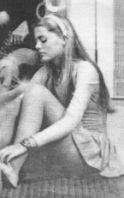 Set in the year 2033, "Luna" was a futuristic kids sitcom about a girl (Luna, played by a teenage Patsy Kensit) and her 'nabiviron group' (a synthetically breeded family!), who included her brother, a specky geek called Brat, and '80s throwback Gramps - who (very amusing this) would listen to old-time groups like Haircut 100. Being a keen young fan of shows like Doctor Who, Blakes Seven, Space 1999, anything space age was right up my strasse. Aaron Brown, who played Luna's brother Brat, later appeared in the "Seaview", this time as Yvette Fielding's speccy geek brother. Patsy Kensit left after the first series, and went on to bigger (but not better) things. The coolest thing about "Luna" was the characters had their own language, Techno Talk, a sort of "Clockwork Orange"-style future slang. How many of these words do you remember: computerbodge, dimini male, culturoid, bureaubureau, totaloke, teletalk linkup?
Set in the year 2033, "Luna" was a futuristic kids sitcom about a girl (Luna, played by a teenage Patsy Kensit) and her 'nabiviron group' (a synthetically breeded family!), who included her brother, a specky geek called Brat, and '80s throwback Gramps - who (very amusing this) would listen to old-time groups like Haircut 100. Being a keen young fan of shows like Doctor Who, Blakes Seven, Space 1999, anything space age was right up my strasse. Aaron Brown, who played Luna's brother Brat, later appeared in the "Seaview", this time as Yvette Fielding's speccy geek brother. Patsy Kensit left after the first series, and went on to bigger (but not better) things. The coolest thing about "Luna" was the characters had their own language, Techno Talk, a sort of "Clockwork Orange"-style future slang. How many of these words do you remember: computerbodge, dimini male, culturoid, bureaubureau, totaloke, teletalk linkup?
|
|
|
BOX OF DELIGHTS 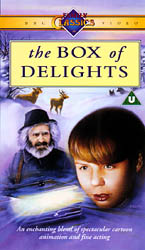 Based upon John Masefield's book, "The Box Of Delights" is the kind of magical, old-fashioned childrens drama that the BBC used to be able to knock out in their sleep. Edwardian toff schoolboy Kay Harker is entrusted with a magical box by a mysterious Punch & Judy man (Patrick Troughton) whom he meets at a train station when he arrives home for the Christmas holidays. All sorts of sinister types, including some very unlikely-looking clergymen, are after the box. If you've seen this, chances are you haven't forgotten it. Robert Stephens, who I later saw play King Lear at the RSC, is masterful as the sinister, evil Abner Brown, and James Grout's guileless policeman is one of the many supporting characters who light up the screen. Stephens and Grout were both in Radio Four's epic adaption of "Lord Of The Rings" a few years earlier. Based upon John Masefield's book, "The Box Of Delights" is the kind of magical, old-fashioned childrens drama that the BBC used to be able to knock out in their sleep. Edwardian toff schoolboy Kay Harker is entrusted with a magical box by a mysterious Punch & Judy man (Patrick Troughton) whom he meets at a train station when he arrives home for the Christmas holidays. All sorts of sinister types, including some very unlikely-looking clergymen, are after the box. If you've seen this, chances are you haven't forgotten it. Robert Stephens, who I later saw play King Lear at the RSC, is masterful as the sinister, evil Abner Brown, and James Grout's guileless policeman is one of the many supporting characters who light up the screen. Stephens and Grout were both in Radio Four's epic adaption of "Lord Of The Rings" a few years earlier.
 The whole production is a box of delights - a haunting soundtrack by the BBC's legendary Radiophonic Workshop, the very best special effects the BBC had at their disposal (mostly Quantel Digital Paintbox)
, a very sophisticated script with lots of 1930s schoolboy slang, and Patrick Troughton in one of his last roles before his death - one of my first chances to see a 'old' (pre-Tom) Doctor acting. The whole thing has a wonderfully nostalgic, warm, Christmassy feel. The whole production is a box of delights - a haunting soundtrack by the BBC's legendary Radiophonic Workshop, the very best special effects the BBC had at their disposal (mostly Quantel Digital Paintbox)
, a very sophisticated script with lots of 1930s schoolboy slang, and Patrick Troughton in one of his last roles before his death - one of my first chances to see a 'old' (pre-Tom) Doctor acting. The whole thing has a wonderfully nostalgic, warm, Christmassy feel.
|
|
|
JONNY BRIGGS 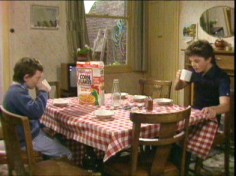 The most put-upon Northern schoolboy since that kid in "Kes", Jonny Briggs was the titular character in this great Childrens BBC drama. Well overdue for a repeat I'd say. With his well-meaning acts constantly ending in disaster and his schooldays made hell by the 'terrible twins', from the point of view of your average 7 year old "Jonny Briggs" seemed very much like a fly on the wall documentary! Mind you, you were lucky if you had a form teacher as sympathetic as Johnny's Miss Broom. The most put-upon Northern schoolboy since that kid in "Kes", Jonny Briggs was the titular character in this great Childrens BBC drama. Well overdue for a repeat I'd say. With his well-meaning acts constantly ending in disaster and his schooldays made hell by the 'terrible twins', from the point of view of your average 7 year old "Jonny Briggs" seemed very much like a fly on the wall documentary! Mind you, you were lucky if you had a form teacher as sympathetic as Johnny's Miss Broom.
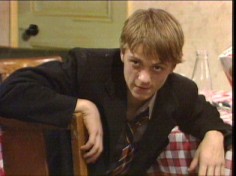 Who can forget Jonny's mental brother Humph, plotting his "extravaganza in the park"; 'our Rita' with her angora sweater and amazingly insipid friend Mavis, constantly mooning about two boys who wore 'thong sandals' (I still have no idea what those are); Johnny's old fashioned mam and dad (the dad was played by Leslie Schofield, who went on to lust after Louise Jameson in "Eastenders"); wise eldest brother Albert practising his eyebrow-raising skills for his debating society meetings; and other homely family scenarios, not to mention the fantastic brass band music played over the credits. Who can forget Jonny's mental brother Humph, plotting his "extravaganza in the park"; 'our Rita' with her angora sweater and amazingly insipid friend Mavis, constantly mooning about two boys who wore 'thong sandals' (I still have no idea what those are); Johnny's old fashioned mam and dad (the dad was played by Leslie Schofield, who went on to lust after Louise Jameson in "Eastenders"); wise eldest brother Albert practising his eyebrow-raising skills for his debating society meetings; and other homely family scenarios, not to mention the fantastic brass band music played over the credits.
|
|
|
MARMALADE ATKINS 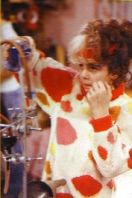 When I was a little lad, there were three programmes that my parents disapproved of. One was "Grange Hill", the other was "The Young Ones", but the worst offender was "Marmalade Atkins". Whilst "Grange Hill" encouraged "young people all across the nation to talk cockney and be insubordinate" (to quote a sketch in "The Young Ones") "Marmalade Atkins", however, was the ultimate rebel. You could tell because she called everyone 'cock' - the height of anarchy to my innocent young self! A junior cross between Minnie The Minx, Johnny Rotten and Alex in "A Clockwork Orange", she was one of my pre-pubescent heroines, alongside Debbie Harry and (don't laugh) Toyah. God I feel old.
When I was a little lad, there were three programmes that my parents disapproved of. One was "Grange Hill", the other was "The Young Ones", but the worst offender was "Marmalade Atkins". Whilst "Grange Hill" encouraged "young people all across the nation to talk cockney and be insubordinate" (to quote a sketch in "The Young Ones") "Marmalade Atkins", however, was the ultimate rebel. You could tell because she called everyone 'cock' - the height of anarchy to my innocent young self! A junior cross between Minnie The Minx, Johnny Rotten and Alex in "A Clockwork Orange", she was one of my pre-pubescent heroines, alongside Debbie Harry and (don't laugh) Toyah. God I feel old.
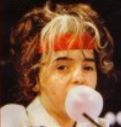 The programmes were written by Andrew Davies, an immensely talented scriptwriter who was responsible for the screenplays of "Pride & Prejudice" (1995), the BBC version of Kingsley Amis's "Old Devils" and most recently "Bridget Jones's Diary". The first series was based upon his book "Marmalade Atkins in Space", a very funny, surreal book featuring the classic phrase "Archbishops in jelly!". Marmalade's parents (very common and very rich, probably criminals) spent all their time putting Marmalade in girl schools. Every episode would began with her social worker giving the viewer a "Bad Girl Warning!" and would invariably end with the line, "Marmalade Atkins, you are expelled!". Being bad never looked so much fun, which is probably why I wasn't allowed to watch it... The programmes were written by Andrew Davies, an immensely talented scriptwriter who was responsible for the screenplays of "Pride & Prejudice" (1995), the BBC version of Kingsley Amis's "Old Devils" and most recently "Bridget Jones's Diary". The first series was based upon his book "Marmalade Atkins in Space", a very funny, surreal book featuring the classic phrase "Archbishops in jelly!". Marmalade's parents (very common and very rich, probably criminals) spent all their time putting Marmalade in girl schools. Every episode would began with her social worker giving the viewer a "Bad Girl Warning!" and would invariably end with the line, "Marmalade Atkins, you are expelled!". Being bad never looked so much fun, which is probably why I wasn't allowed to watch it...
|
|
|
LOOK AND READ 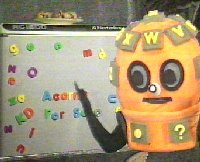 I can probably trace my love of English back to two things. One, the "Doctor Who" paperbacks my mum would buy me every month. Two, the proliferation of entertaining educational programmes on BBC Schools such as "Look and Read", "You and Me", and "Near and Far". You can probably trace the astronomically high illiteracy rates today to the current absence of said factors. Although, maybe I'm just idealising my childhood and was quite fortunate. Anyway, of all of these progs, "Look & Read" was the one that made the school's 'TV room' the place to be.
I can probably trace my love of English back to two things. One, the "Doctor Who" paperbacks my mum would buy me every month. Two, the proliferation of entertaining educational programmes on BBC Schools such as "Look and Read", "You and Me", and "Near and Far". You can probably trace the astronomically high illiteracy rates today to the current absence of said factors. Although, maybe I'm just idealising my childhood and was quite fortunate. Anyway, of all of these progs, "Look & Read" was the one that made the school's 'TV room' the place to be.
Presented by the excitable and very camp 'Wordy', a disembodied floating orange head covered in letters (I think he was supposed to look like the ball on a IBM typewriter); and songs on grammar usually sung by Derek Griffiths (Seen and heard doing his thing on Playschool, Heads & Tails, Bod and Film Fun to name but a few). 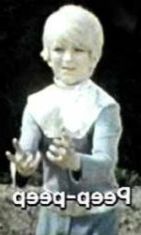 These songs would dispense such advice as "Think big, big, big at the beginning. At the end - full stop! Full stop!". Eat your heart out, Pink Floyd. However, the highlight were the mini-dramas that would last a whole term, and aim to introduce literacy concepts in an exciting way (every story seemed to involve having to decipher a code, and other word games). The one everyone remembers (mainly because it was shown in various forms over 15 years) was "The Boy From Space", a really strange space story originally shown in black and white in 1971 and re-edited and repeated in colour in the early '80s. Both ludicrous and disturbing at the same time, with special effects of the standard you would expect, and prefiguring some of the themes of ET, "The Boy From Space" was a once-seen, never-forgotten gem. Another classic was "Dark Towers", an excellent ghost story (written by Andrew Davies, see "Marmalade Atkins", above) with Christopher Biggins as one half of comedy conmen Benger & Bounce. My favourite was "Sky Hunter", all about barges and peregrine falcons which featured Geoffrey Bayldon, of "Catweazel" and "Worzel Gummidge" fame! My first 'God, I am getting old' moment was watching the repeats when I was resitting my A levels and seeing the kids from "Sky Hunter" had been brought back as adults to do the links between the scenes! Freaky. These songs would dispense such advice as "Think big, big, big at the beginning. At the end - full stop! Full stop!". Eat your heart out, Pink Floyd. However, the highlight were the mini-dramas that would last a whole term, and aim to introduce literacy concepts in an exciting way (every story seemed to involve having to decipher a code, and other word games). The one everyone remembers (mainly because it was shown in various forms over 15 years) was "The Boy From Space", a really strange space story originally shown in black and white in 1971 and re-edited and repeated in colour in the early '80s. Both ludicrous and disturbing at the same time, with special effects of the standard you would expect, and prefiguring some of the themes of ET, "The Boy From Space" was a once-seen, never-forgotten gem. Another classic was "Dark Towers", an excellent ghost story (written by Andrew Davies, see "Marmalade Atkins", above) with Christopher Biggins as one half of comedy conmen Benger & Bounce. My favourite was "Sky Hunter", all about barges and peregrine falcons which featured Geoffrey Bayldon, of "Catweazel" and "Worzel Gummidge" fame! My first 'God, I am getting old' moment was watching the repeats when I was resitting my A levels and seeing the kids from "Sky Hunter" had been brought back as adults to do the links between the scenes! Freaky.
|
|
|
INTO THE LABYRINTH 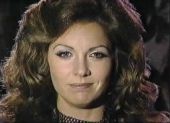 A minor classic from the Welsh channel HTV, "Into The Labyrinth" was a rumdiggity fantasy adventure that ran for three seasons from 1980 to 1983. Three kids were sent into time and space to help Ron Moody (Fagin from "Oliver!") retrieve a magical stone 'the Nidus' from the evil sorceress Belor, played by Pamela Salem with much camp gusto. Although the capers spanned various centuries (eg Gunpowder plot, Ancient Greece etc), most of the action seemed to take place in Wookey Hole-esque caves. Pamela Salem, who played Belor, had previously played Toos in the highly acclaimed "Doctor Who" yarn "The Robots of Death" - and a couple of years later Miss Moneypenny in "Never Say Never Again". Quite easily the foxiest female baddy in TV fantasy! The series' formula was undoubtedly the inspiration for the immeasurably inferior "T-Bag" series.
A minor classic from the Welsh channel HTV, "Into The Labyrinth" was a rumdiggity fantasy adventure that ran for three seasons from 1980 to 1983. Three kids were sent into time and space to help Ron Moody (Fagin from "Oliver!") retrieve a magical stone 'the Nidus' from the evil sorceress Belor, played by Pamela Salem with much camp gusto. Although the capers spanned various centuries (eg Gunpowder plot, Ancient Greece etc), most of the action seemed to take place in Wookey Hole-esque caves. Pamela Salem, who played Belor, had previously played Toos in the highly acclaimed "Doctor Who" yarn "The Robots of Death" - and a couple of years later Miss Moneypenny in "Never Say Never Again". Quite easily the foxiest female baddy in TV fantasy! The series' formula was undoubtedly the inspiration for the immeasurably inferior "T-Bag" series.
|
|
|
|
THE HAUNTING OF CASSIE PALMER 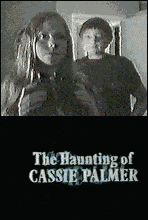 Creepy horror drama for older kids about a girl who is the seventh daughter of a seventh daughter. On her thirteenth birthday she discovers that she has supernatural powers and starts being haunted by various evil spirits, including the malevolent ghost Deverill, who generally made her life a misery. Yep, it's "Carrie" meets "To The Devil A Daughter". Shit-yer-pants scary, nightmare-inducing stuff, including a rather shocking scene in which a poltergeist pushes her mum (Elisabeth Spriggs) down the stairs. See also "The Ghost of Thomas Kempe", another modern day ghost serial based upon a childrens book.
Creepy horror drama for older kids about a girl who is the seventh daughter of a seventh daughter. On her thirteenth birthday she discovers that she has supernatural powers and starts being haunted by various evil spirits, including the malevolent ghost Deverill, who generally made her life a misery. Yep, it's "Carrie" meets "To The Devil A Daughter". Shit-yer-pants scary, nightmare-inducing stuff, including a rather shocking scene in which a poltergeist pushes her mum (Elisabeth Spriggs) down the stairs. See also "The Ghost of Thomas Kempe", another modern day ghost serial based upon a childrens book.
|
|
|
|
SAPPHIRE AND STEEL 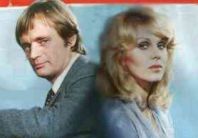 Ask anyone to explain what Sapphire and Steel was actually about, and they'll be hard pressed to give a coherent answer other than a few "ums" and "ahs". Ask them what Sapphie and Steel was like and the reply will be a variation on the phrase "Out of its fucking head, mate", or "Kiffed" if they're Welsh. Yep, "Sapphire and Steel" was weird-o-rama, a pretentious science fiction drama starring Joanna Lumley and David McCallum, who would investigate freaky paranormal spacey conundrums.
Ask anyone to explain what Sapphire and Steel was actually about, and they'll be hard pressed to give a coherent answer other than a few "ums" and "ahs". Ask them what Sapphie and Steel was like and the reply will be a variation on the phrase "Out of its fucking head, mate", or "Kiffed" if they're Welsh. Yep, "Sapphire and Steel" was weird-o-rama, a pretentious science fiction drama starring Joanna Lumley and David McCallum, who would investigate freaky paranormal spacey conundrums.
Notorious for its use of such no-budget cop-outs as invisible force fields (provoking much 'existential glass box'-style mime acting). The stories would usually end with unresolved paradoxes, the most head-hurting one was a tracking shot that pulled out to reveal a suburban living room to be floating in a black void, which give me lots of nightmares of falling into space every time I left the house!
|
|
|
THE HITCH HIKERS GUIDE TO THE GALAXY  By the time of the TV series, Douglas Adams' space-based comedy had already been a radio serial, a book and an LP. I was too young to remember the original transmission in much clarity (except for the Babelfish sequence, urgh!). However, by the time it was repeated in 1987 puberty had just kicked in and I had just discovered David Bowie's colourful, complex world and "Monty Python's Flying Circus", which the BBC had also started repeating. The "Hitch Hikers" style of humour completely clicked with me and was also very silly. These three influences above all shaped my sense of humour and my outlook at an extremely impressionable age.
By the time of the TV series, Douglas Adams' space-based comedy had already been a radio serial, a book and an LP. I was too young to remember the original transmission in much clarity (except for the Babelfish sequence, urgh!). However, by the time it was repeated in 1987 puberty had just kicked in and I had just discovered David Bowie's colourful, complex world and "Monty Python's Flying Circus", which the BBC had also started repeating. The "Hitch Hikers" style of humour completely clicked with me and was also very silly. These three influences above all shaped my sense of humour and my outlook at an extremely impressionable age.
The TV version looks and sounds like nothing the BBC had done before - excellent location work, the brilliant animations of the Guide's readouts, spacious sets, and a beautiful soundtrack by Paddy Kingsland, although the great theme tune was actually taken from an Eagles album! The cast is perfect (mostly from the radio series), and Sandra Dickinson's squeaky-voiced dumb blonde image was used to brilliantly anachronistic effect by casting her as the astrophysicist Trillian. 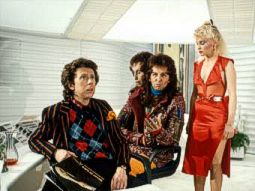 Apparently much of the above-mentioned visual wonderment was to the credit of the production department overcoming the BBC's notoriously small budgets: the Guide's animated readouts were not done on computer, as widely believed, but were letraset lettering and graphic pen illustrations on acetates photographed frame-by-frame; the interior of the Vogon ship were sets from "Alien", which Ridley Scott had just filmed in Elstree; and many of the impressive long shots, such as the monolithic computer Deep Thought, were matte paintings by a French fine artist! Apparently much of the above-mentioned visual wonderment was to the credit of the production department overcoming the BBC's notoriously small budgets: the Guide's animated readouts were not done on computer, as widely believed, but were letraset lettering and graphic pen illustrations on acetates photographed frame-by-frame; the interior of the Vogon ship were sets from "Alien", which Ridley Scott had just filmed in Elstree; and many of the impressive long shots, such as the monolithic computer Deep Thought, were matte paintings by a French fine artist!
 Watched again, looking past the humour it's amazing just how pessimistic it is - it's constantly reiterated that coming 'out of the trees' (the title of another Douglas Adams TV project, incidentally) and evolving was the human race's biggest mistake! Although Ford Prefect buying a round and getting change from a fiver radically dates the programme, Adams' jokes about humanity becoming a race of assistant managers are still prophetic, as is the great line "The human race are currently standing around a bath making documentaries of themselves!" (Big Brother?). It's impossible to hear Louis Armstrong's "Wonderful World" without picturing the poignant last scene, as Ford and Arthur walk into the horizon on prehistoric Earth... The world would be a poorer place if Douglas Adams had not created "Hitch Hikers", and he is sorely missed. Watched again, looking past the humour it's amazing just how pessimistic it is - it's constantly reiterated that coming 'out of the trees' (the title of another Douglas Adams TV project, incidentally) and evolving was the human race's biggest mistake! Although Ford Prefect buying a round and getting change from a fiver radically dates the programme, Adams' jokes about humanity becoming a race of assistant managers are still prophetic, as is the great line "The human race are currently standing around a bath making documentaries of themselves!" (Big Brother?). It's impossible to hear Louis Armstrong's "Wonderful World" without picturing the poignant last scene, as Ford and Arthur walk into the horizon on prehistoric Earth... The world would be a poorer place if Douglas Adams had not created "Hitch Hikers", and he is sorely missed.
|
|
|
DOCTOR WHO 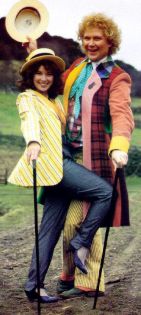
"Doctor Who" in its wider context is a topic to be discussed elsewhere, but it was "Doctor Who" in the '80s that I grew up with. It began for me with the last two seasons of Tom Baker's lengthy run - where I experienced the cliches of 'hiding behind the sofa' during the vampire story "State of Decay" (so scary at the time I was stopped from watching it for two weeks after having nightmares!). I witnessed the historic moment as he regenerated into Peter Davison after plummeting from a satellite dish in a struggle with his arch enemy, the Master. The adventures of the cricket-loving, celery-eating floppy-fringed one were as much a part of my early schooldays as Top Of The Pops, Action Force figures and dealing crack (only joking - I never watched Top Of the Pops! Heh!) On the subject of "Doctor Who", people will always make startlingly original observations about the special effects not being much cop, but the cast and crew had such obvious devotion to their work that more than compensates for technical deficiencies. When the show was given the kind of great stories it was capable of, everyone rises to the occasion and you can see why "Doctor Who" became such a national institution for many years. Shame the odd stinker, like 1982's "Time Flight", is such a lost cause that not even Kubrick could save it!
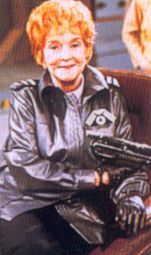
The sad thing about "Doctor Who" in the 1980s is how many nails the decade put in its coffin. Alas, a victim of the celebrity-obsessed 'light entertainment' 80s TV syndrome that gave us "Wogan" and "Through The Keyhole", the production team became obsessed with shoehorning some unlikely guest stars into the stories for publicity. Outside of "Blankety Blank", "Resurrection of the Daleks" is the only place where you are likely to see Rula Lenska, Rodney Bewes, Leslie Grantham and Chloe Ashcroft from "Play School"! And you had to see Beryl Reid battling the Cybermen to believe it! And then along came Colin Baker. Casting Colin Baker was a bit like David Bowie releasing "Tin Machine". An unpopular change of style that had some good things about it, but is very hard to defend without having the piss taken out of you. His decision to make the Doctor
rather unlikeable was in theory an interesting idea, but it's not the kind of thing you do when you are replacing a very popular, well-liked actor! Introducing Bonnie Langford as a companion was just sadomasochistic.
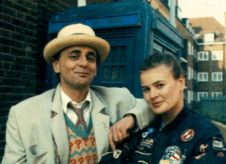 Sylvester McCoy replaced Colin Baker, playing the Doctor for three seasons. I was now at comprehensive school, and liking "Doctor Who" wasn't very cool, so I lost interest, only following it intermittently. A shame, as the stories from this era were really adventurous, with less reliance on old villains, TARDIS scenes and continuity bollocks. "The Happiness Patrol", "Paradise Towers", "Ghost Light" and "The Curse of Fenric" show how "Doctor Who" could have reinvented itself into the '90s as a postmodern, multi-layered sci fi drama. Sadly, it was not to be, and that's the history of "Doctor Who" in the 1980s - and by extension, the entirety of my TV childhood. Sylvester McCoy replaced Colin Baker, playing the Doctor for three seasons. I was now at comprehensive school, and liking "Doctor Who" wasn't very cool, so I lost interest, only following it intermittently. A shame, as the stories from this era were really adventurous, with less reliance on old villains, TARDIS scenes and continuity bollocks. "The Happiness Patrol", "Paradise Towers", "Ghost Light" and "The Curse of Fenric" show how "Doctor Who" could have reinvented itself into the '90s as a postmodern, multi-layered sci fi drama. Sadly, it was not to be, and that's the history of "Doctor Who" in the 1980s - and by extension, the entirety of my TV childhood.
|
Pictures shamelessly taken from lots of other people's pages. The fantastic site
TV Cream and the BBC's I Love TV page in the Cult Zone were extremely resourceful for info, facts and trivia, and are highly recommended. The TV Lounge features some superlative links. For old skool station idents and Public Information films, visit Andrew Wiseman's TV Room
The indispensible Radio Times Guide to TV Comedy compiled by Mark Lewisohn (BBC Books, 1998) was very nifty in providing broadcast dates, cast lists and brief descriptions of some of these programmes. For further reading, I suggest Mrs Slocombe's Pussy by Stuart Jeffries (Flamingo, 2000), a superb look at how television has influenced our popular culture in the last three decades.

|
